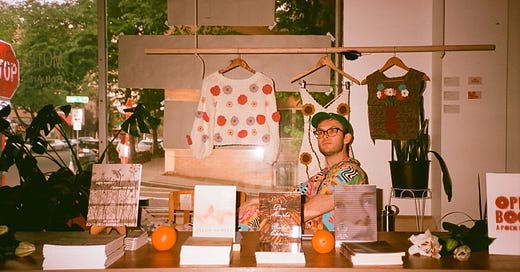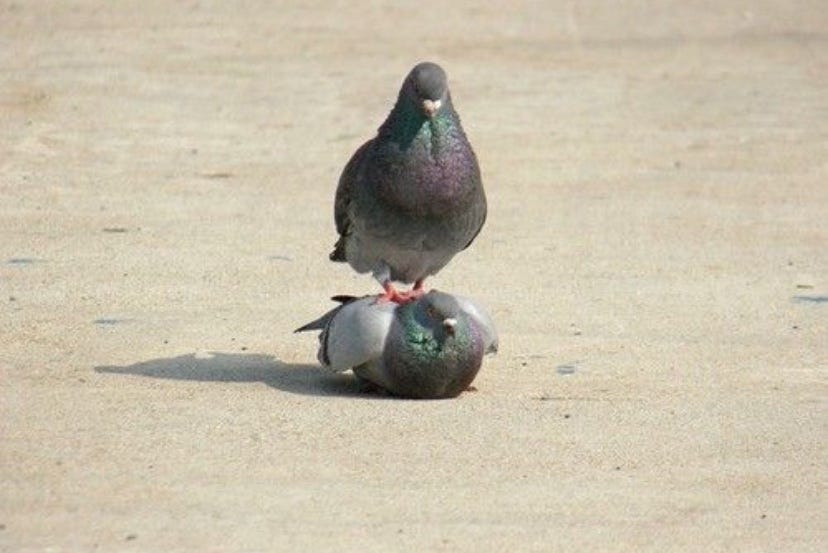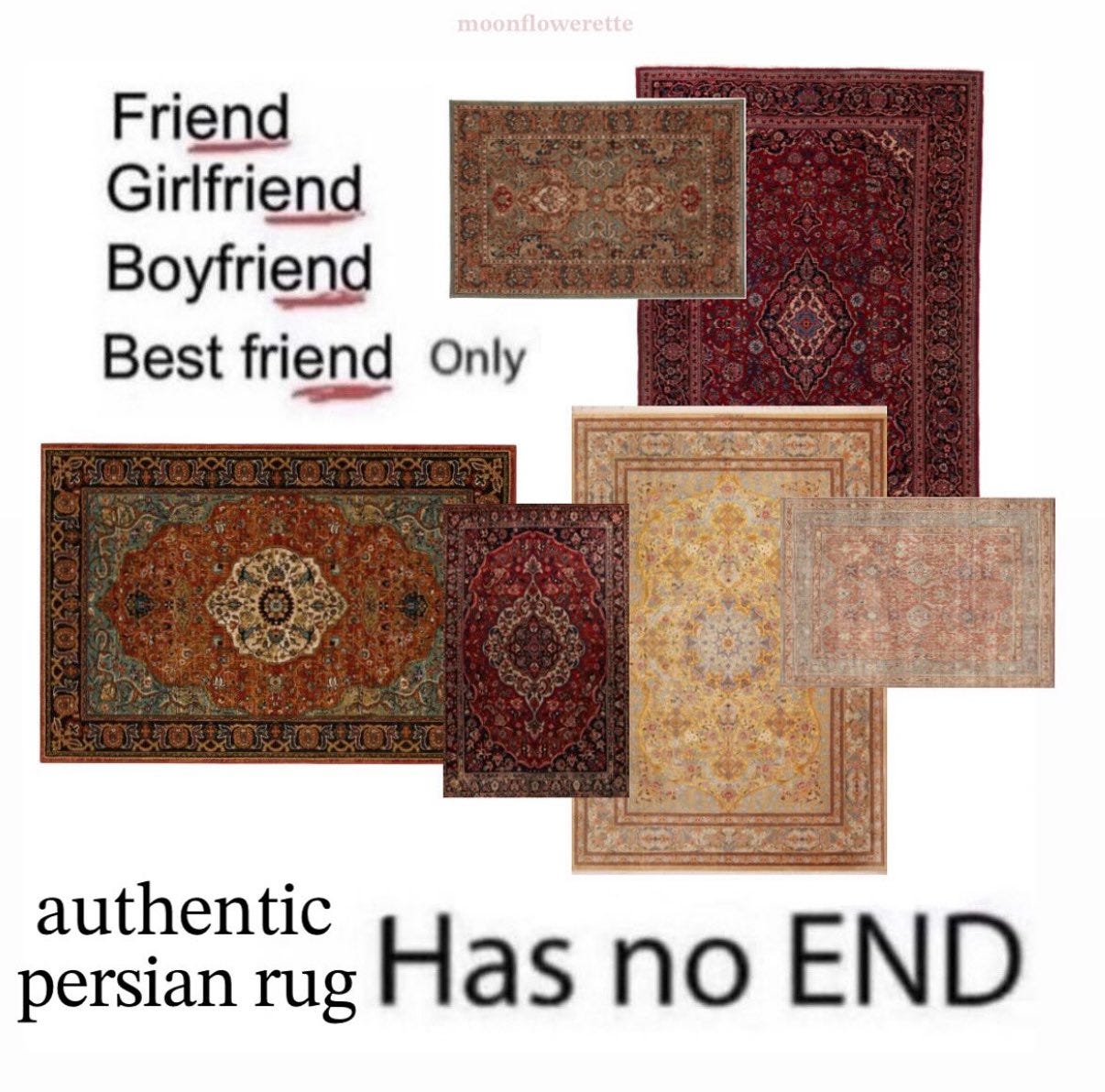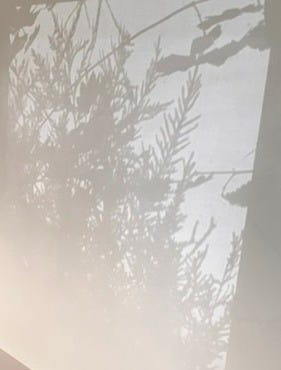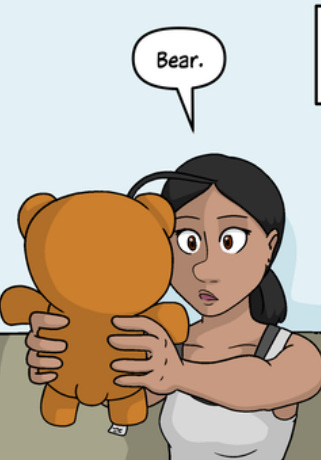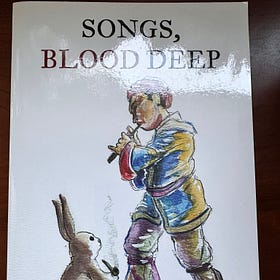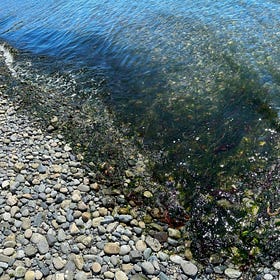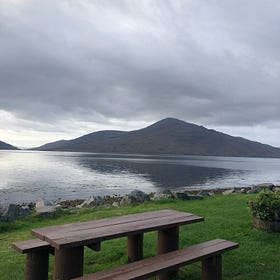What a full week! Let us all sit in this moment before reading with a breath, let it fill your chest and stomach, and release. You have made it through May (mostly) and are still coming together to celebrate and support yourself. These are feats.
An update for you all, I’ve largely done away with any form of paywall, and instead will just be leaving this little button here. If you like something especially, feel free to throw me a couple bucks!
Laughter has been a communal form for me of late. A carafe at the dinner table served after the meals have been cleared. A shoe rack with all number of guests’ piled up. You know - sunlight indiscriminately placating the welcoming bodies below. More and more of my life is becoming devoted to poetry in an embodying sense. This past week I went to some four unique poetic events. It thrills me, to think that of all the time and constraints one has to life, I can still find a way to spill the poem so frequently.
I suppose these essays have shifted quite a lot since I originally began them. Change isn’t to be feared by any means, and it’s natural to find a hole of craft or effort that appeals after doing something weekly for nine months, but I am aware that they are immensely different from my near third-party observations of the world and documenting diaristically small glimpses of joy. But perhaps this is because I am learning, too, how to conjoin thought and theory to laughter. Think of this snippet of theory from Chirstian Kandler’s “Nature and Nurture in Personality Development: The Case of Neuroticism and Extraversion,” (a mouthful of a title isn’t it):
As life narratives and memories cumulate across the life span, effects of life experiences may cumulate, too. Thus, environmental effects on interindividual differences in neuroticism and extraversion may cumulate with age, leading to an increase in environmental variance (McCartney, Harris, & Bernieri, 1990).
Simplification has been one of the funnier modes to operate in for me lately. This study was effectively trying to say how one grows up can make someone more or less susceptible to pathologizations of neuro-atypical behavior. Or: things can happen which fuck you up. I couldn’t tell you why I read things like this when I have no stake in the game, no horse in the race, no team on the field, except that sometimes it is very fun to me to place myself within scholarly fields that I have no right or endorsement of belonging in.
In a way, I suppose it’s a form of mockery - so much of scholarship and academia is gated around such hyperspecific terminologies which make their scholarship inaccessible at best, and ridiculously long-winded for simple concepts at worse. Though, mockery is not intended to stop this scholarship entirely. In fact, the purpose of the paper referenced above was explicitly stated to have been written to serve as support for more profound studies and funding on the exact parameters and affects of unique environments on individual wellbeing. This is a good thing! More research to understand how, why, and what is fucking us up will help us down the line - in theory - and this needs to be pared with an accessibility for the human factors to become aware of why what they do fucks us up and how to be in ways that do not fuck us up.
This, too, is a form of community to me. To read someone is to see someone is to know someone. And in that way, one can then enter into the exchange where one can both discuss what one needs to receive and give. For instance, I worked a poetry reading where I was entering the space fairly low. I didn’t have the social energy to entreat myself, to charismatically charm a substantial crowd of individuals who I’ve known for literal years in many cases, and I felt bereft after the fact that I wasn’t able to offer my thoughts to them. And after the event I had several messages from individuals apologizing for not being able to connect with me there, either - whether hunger pangs took them away abruptly, or their own lack of energy kept them restrained. I don’t think an apology was necessary on their behalf in much of an oppositional perspective to the drive for my own apologetic stance. Yet community brought this kind of knowing together regardless, and I think this type of knowledge and exchange is an invaluable type of poetry.
In another “Cody, what are you reading?” I found this essay by Gillie Bolton, “Every Poem Breaks a Silence That Had to Be Overcome: The Therapeutic Power of Poetry Writing,” to be interesting:
Writing poetry is a way of grasping life, nurturing every bit of good, connecting up severed bits of ourselves; it is written from our whole self - mind, spirit and body. Poetry, even when it concerns death, pain, disfigurement, despair, is vibrant, alive, a way of life.
The piece is clearly written for an audience of individuals who are not, how should I say, the crowd of deep-poetic-critics, people who have taken multiple workshops or academic scholarship toward poetry, who’ve devoted a large portion of their lives to poetry. And so a part of me wants to coquettishly contradict the writing - that poetry does not always have to come from the self, it can be a recitation, a documentary, an archival experiment in language - that poetry as a form of nurturing good is, also, not true; that there are thousands of examples of poets who write toward the evils of this world - that final sentiment of ‘even,’ doing so much work - that vibrant is a completely different topology than a way of life. But in its effort, this essay is trying to explain the unique ways that individuals can access poetry as a means of comforting through grief, of creating through unknowable traumas, and of creating a type of happiness only available with poetry. How is this any different from what I am describing and have experienced with regard to my involvement with poetry events?
I co-hosted our sixth(!) Other People’s Poems this past weekend and it was immensely restorative to me. We selected three readers who come from unique walks of the Seattle independent publishing scene (magazines, event spaces, etc.), and they all chose to read, for their other people, largely Seattle poets, or people whose poetries are invoked often in Seattle. They read past-OPP-readers, they read debut authors who were sitting in the crowd watching. It was, by all means, an immense celebration of the prominent talent and work that Seattle writers do to uphold each other through their community.
For my final quote for this essay, I’ll bring you to Neal Alexander’s “Imaginative Geographies: The Politics and Poetics of Space,” (which I suspect had to be a significantly compromised title due to the sheer presence of Gaston Bachelard’s “Poetics of Space”):
As doreen Massey comments: ‘over and over again, time is defined by things such as change, movement, history, dynamism; while space, rather lamely by comparison, is simply the absence of these things.’ The combined result of these assumptions and their persistence in critical thought has been to effectively depoliticise space and geography, and to deny them any significant role in the currents of history, which was typically understood solely in terms of time and temporality. Yet, as Foucault remarks, ‘space is fundamental in any form of communal life; space is fundamental in any exercise of power’.
To make and hold space for poetry is to make and hold space for transformative power, for a vibrancy, for a way of life that can contend with the radical and nuanced traumas that are invented daily. For the sensitive individual, community becomes a politics of survivability - that we can get through this together, we can ensure that everybody is fed and housed and has the ability to create and maintain their own spaces.
Ending in infinity, I return to the beginning. Here are more of my laughs and their flavors.
Andrew and I return to playing the game ‘Enshrouded,’ which is a survival RPG game wherein your character is tasked with bringing flame and light to a world that is being plagued with ‘shroud,’ which corrupts life into undeath. We beat the first real ‘boss,’ of the game, located in the courtyard of a sheerly massive castle. As we entered the castle, exploring its abandonments and climbing through every little hole to locate its secrets and treasures, we realized the game held some three or four stories worth of height to this castle that were, effectively, inaccessible. Surely, we thought, there must be something at the top of the castle. So, in true elder scrolls fashion, we abused object interactions and made our own makeshift paths up to the top of the castle. The fiasco took us some thirty minutes of diligently hopping between bricks and mining out a makeshift staircase through a mycelium network. Yet when we reached the top? Nothing, except for a view, and the satisfaction that we had conquered the castle. Oh, a great laugh.
Cora, Kristin, Cain, Heather and I all went to a Seattle Reign women’s soccer game. I couldn’t spell out specific laughs from this except for getting to flex my specific and encyclopedic knowledge of the goings-ons of women’s soccer, jokes for the masc-presenting folk of “tell me how, if you were on the pitch, you, as a man, would do that play better?”
I had some bespoke onigiri this week. Delicious pickled plums, eggplant, sesame, miso, all types of it. I would happily eat that onigiri forever, and my first bites of it almost had me laughing from how widely I beamed. Food joy. So rare to find in my latest developments of medical-induced-dietary restrictions. And yet: umami!
Heather and I are fairly robust fans of the streaming service Dropout and I must share that their latest Gamechanger episode was incredible. Three comedians were pulled to do crowdwork with a (unbeknownst to them) handpicked audience of individuals with remarkably interesting secrets or stories to share. There was a representative Seattle-tilian who heralded theirself from the Seattle kink scene for diaper-kinks. I confess a lot of live comedy shows tend to not get me - for whatever reason the potential for cringe is my threshold - but this was a gem of a performance from start-to-finish.
Thank you for reading these, and I hope this writing finds you in peace and comfort. Much love to your eyes and mind. If you appreciate my writing, a like, a comment, a share, or a free subscription are all ways to support me. If you really freakin’ love me, you can send me some money.
Poetry Read Aloud: Gwen Nell Westerman's Billboard Warning
You can purchase "Songs Blood Deep," by Gwen Nell Westerman here.
13 Poetry Readings, 13 Micro Reviews
Poetry, the necessary jewel that it is, is only one means of accessing that most active soul of the poet. I read poems because poems are meant to be read. And I try to insist on poetry to others because poetry is like the moon’s insistence to language’s tidal currents. I have been reading Jacques Derrida’s essays in “The…
How to Promote Your Book
I will begin this exercise by stating: every opinion herein is a result of my knowledge and experience in: literary criticism, book promotion, audience generation, and digital marketing. I have not personally published a manuscript yet and therefore do not know the trials and tribulations t…

